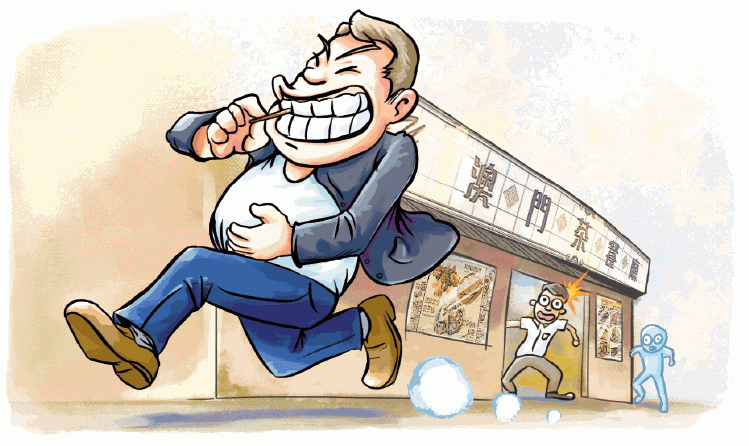
Previously, we introduced two other Chinese words related to the character “霸(bà)”: “学霸(xuébà)” and “麦霸(màibà).” In this issue we will learn about another one, which is “霸王餐(bàwángcān).”

Literally, “霸(bà)” means “to dominate, lord over, tyrannize over or rule by force” and “王(wáng)” means “king.” Together, “霸王(bàwáng)” refers to “an overlord or an overbearing ruler” and “餐(cān)” means “meal.”
Knowing this, many students might jump to the conclusion that “霸王餐(bàwángcān)” refers to an overlord’s meal. Then it must mean a giant feast, right?
Think again! The Chinese language loves to throw these tricky curveballs for students. In this case, it is not as easy as combining the meanings of the individual characters. “霸王餐(bàwángcān)” has nothing to do with an overlord’s meal. What it actually refers to is “dine and dash,” when someone orders food at a restaurant, but then refuses to pay the bill. These freeloaders think they have the right to eat for free, similar to how an overlord would.
So, how are these despicable people getting away with “霸王餐(bàwángcān)”? Some people may make excuses for slipping away after finishing their meals in restaurants, then they never return to pay the bill. Some may make a false complain about service or food quality, and in return, threaten to eat and drink for free. Some may even deliberately make large orders though they know they can’t afford them. In the end, there’s no such thing as a free lunch, so please don’t ever try “霸王餐(bàwángcān)”!
Examples:
Wǒ bùgǎn chī bàwángcān!
我 不敢 吃 霸王餐!
I wouldn’t dare dine and dash!
Lǐ Míng jīngcháng chī bàwángcān.
李明 经常 吃 霸王餐。
Li Ming often dines and dashes.
Nǐ chūqu chīfàn búdàiqián, shì xiǎng chī bàwángcān ma?
你 出去 吃饭 不带钱, 是 想 吃 霸王餐 吗?
Eating out without money, do you plan to dine and dash?

1. What do you mean when you say someone is having “霸王餐(bàwángcān)”?
A. He/she is enjoying a fancy dinner.
B. He/she is eating out without paying.
C. He/she is eating like a king.
2. The following behaviors are all examples of “霸王餐(bàwángcān)” except ____.
A. Tom made excuses for slipping away after dinner at a restaurant.
B. Tony deliberately ordered too much food, though he knew he couldn’t afford it.
C. Tim didn’t have enough cash to pay for dinner, but promised to pay it back later.



